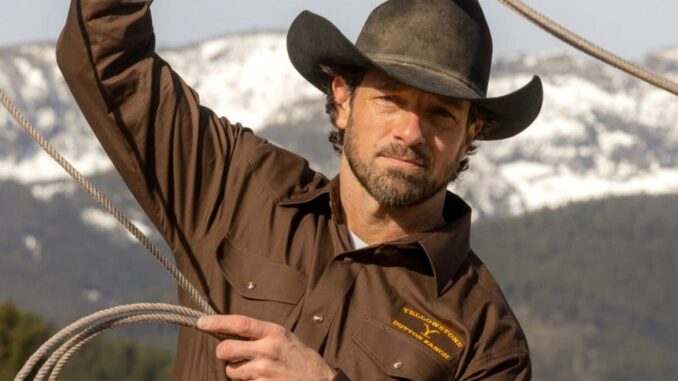
The Digital Dust-Up at the Yellowstone Corral: A Finale's Fiery Aftermath
The digital dust had barely settled. For years, the sprawling saga of the Dutton family and their relentless defense of the Yellowstone Ranch had captivated millions, a modern Western epic steeped in blood, loyalty, and the rugged, unforgiving spirit of the land. Each season of Yellowstone was an event, a cultural touchstone that ignited conversations around dinner tables and in the deepest corners of the internet. But as the credits rolled on the Season 5 finale, marking not just the end of a chapter but, for many, the ambiguous conclusion of a beloved era, the online world didn’t just discuss – it erupted. What followed was a digital stampede, a cacophony of "mixed reactions" that quickly escalated into a full-blown online controversy, a microcosm of modern fandom’s fervent love and its capacity for swift, passionate condemnation.
The initial tremors were born of a unique kind of anticipation. Yellowstone wasn't just a show; it was a phenomenon. Fans had invested years, theories, and emotional energy into the fates of John, Beth, Rip, Kayce, and the sprawling cast of characters. They expected resolution, catharsis, perhaps even a sense of poetic justice in a world where justice was often a bullet or a backroom deal. The build-up to the finale was charged with this weight of expectation, a collective breath held for the final, definitive word from creator Taylor Sheridan.
Then, the episode aired, and the breath was exhaled in a myriad of ways. On one side of the digital fence stood the disappointed and the disoriented. Their comments, ablaze with caps-lock indignation, spoke of plot threads left dangling like broken fence wire, character arcs seemingly abandoned mid-stride, and narrative shortcuts that felt less like artistic choices and more like a rushed exit. "Where was Rip?" screamed one user on X, echoing a sentiment repeated endlessly across forums. "Did they just forget about Jamie's whole storyline?" another lamented on Reddit, highlighting a pervasive feeling that vital pieces of the Dutton mosaic had been inexplicably omitted or unsatisfactorily concluded. For these fans, the finale wasn't a satisfying ending; it was a betrayal, a half-told story that left them feeling cheated out of the closure they believed they had earned through their unwavering loyalty. The ending, they argued, felt less like a grand, deliberate statement and more like a series of fragmented goodbyes, leaving the legacy of the show feeling unmoored and incomplete.
Yet, just as swiftly, a counter-current emerged, a legion of staunch defenders and philosophical interpreters. These fans, equally passionate, rose to the show's defense, arguing that the perceived ambiguities were not flaws but deliberate artistic choices, deeply reflective of the world Taylor Sheridan had painstakingly built. "You just don't get it," one Facebook commenter retorted, "Yellowstone was never about neat little bows. It's about the struggle, the constant fight, and that never truly ends." Others pointed to subtle visual cues, unspoken truths, and the very nature of life on the ranch – cyclical, brutal, and often without clear-cut resolutions. For them, the finale was a bold, authentic conclusion, eschewing conventional Hollywood endings for something more profound and true to the series' gritty heart. The discomfort some felt, they reasoned, was simply a failure to appreciate the nuanced, often bleak, reality that Yellowstone had always championed. They saw depth where others saw gaps, and celebrated the show's refusal to pander to simplistic fan service.
The controversy quickly transcended mere episode critique. It became a broader commentary on the relationship between creators and their increasingly vocal, empowered audience. The internet, with its instantaneous feedback loops and echo chambers, amplified every whisper of discontent and every shout of praise. Forums became digital gladiator arenas where fans, once united by a shared love, now sparred over interpretations and perceived slights. Memes satirizing the confusion, analytical breakdowns attempting to decode every ambiguous glance, and impassioned pleas for "justice for X character" flooded social media feeds. The sheer volume and intensity of the reactions illustrated the deep emotional investment audiences now have in their fictional worlds, fostering a sense of ownership that often clashes with a creator's singular vision.
Ultimately, the mixed reactions to the Yellowstone Season 5 finale weren't just about plot points or character fates; they were about the collision of expectation and artistic intent, a public reckoning with the meaning of an ending for a show that had become more than just entertainment. It highlighted the inherent tension in serial storytelling – the promise of narrative continuity versus the creator's prerogative to conclude their story on their own terms. As the online arguments slowly faded, replaced by new controversies and discussions, the legacy of the Yellowstone finale remained a potent reminder: in the digital age, a beloved story's conclusion is rarely just a final scene. It’s a spark that ignites a thousand conversations, a sprawling, passionate debate that proves, sometimes, the greatest drama happens not on the screen, but in the fiery aftermath among its most devoted fans.
